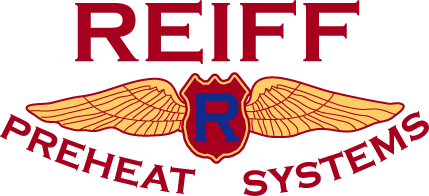

"Long Engine Life Starts With Reiff"
Main Page | Place an Order | Contact Us | FAQ
FAA-PMA Approval
"FAR 21.303(a) No person may produce a modification or replacement part for sale for installation on a type certificated product unless it is produced pursuant to a Parts Manufacturer Approval (PMA) issued under this subpart."
Our products are FAA Approved by PMA PQ2585CE granted in 1995. To obtain a PMA we had to obtain engineering design approval from the Chicago Aircraft Certification Office, and approval of our production system and fabrication inspection system (quality control program) from the Minneapolis Manufacturing Inspection District Office (MIDO). To maintain the PMA, the FAA periodically inspects our facility and audits our fabrication inspection system. We have received a clean bill of health every time.
FAA classifies our engine heaters as minor alterations, so an STC or Form 337 is not needed.
Following is the text FAA has instructed us to place into our installation instructions:
"In accordance with FAR 21.303C(4), Reiff Corp. obtained a design approval for this product. Installation of this heater is a minor alteration and does not require a Form 337 or STC, in accordance with FAR Part 43 Appendix A."
What to do if your A&P/IA tells you he cannot install our products because they are not STC'd...
Refer him to FAA Special Airworthiness Information Bulletin (SAIB) NE-08-40 dated Aug. 8, 2008.
This article in Aircraft Maintenance Technology magazine (Sept 2008) explains it further...
PMA Parts Prevail - FAA establishes legitimacy of PMA parts — Period
Automotive and other non-approved heaters
Occasionally we have a customer or his A&P who believes it is legal to install automotive or other non-approved heaters on the aircraft. Please refer to:
Part 43 Appendix A - Major alterations
(a)(2) Powerplant major alterations. The following alterations of a powerplant when not listed in the engine specifications issued by the FAA, are powerplant major alterations.
(iii) Installation of an accessory which is not approved for the engine
Part 43 Appendix B - Recording of major alterations
(a) ...each person performing a major alteration shall -
(1) Execute FAA Form 337
A non-PMA'd engine heater is an accessory which is not approved for the engine, therefore it is a major alteration and requires a 337 approval by the local FSDO. Some FSDO's may grant it, some may not. By having the PMA we have removed from our customer the burden of obtaining FAA approval. A PMA'd engine heater is a minor alteration requiring just a logbook entry by the mechanic - no 337 is needed. Installation of any heater that is not FAA approved might save you a few bucks, but balance that against the risk of engine damage, legal liability, denial of hull coverage, and FAA trouble.
Not all aircraft engine heaters are FAA approved
One company selling aircraft oil sump heaters advertises their product as being "FAA Accepted". In fact, they do not have a PMA or any other FAA approval. What they do have is a letter from FAA's Chicago office dated August 21, 1985, which states that their product does not require an STC or Form 337. The letter does NOT say that a PMA is not required. Per the FAR's Part 43 Appendix A and B (see above), to be legally installed on a certificated aircraft an engine heater must have either a PMA or a Form 337. The bottom line : this product is not approved for installation on certificated aircraft. Installation of any heater which is not FAA approved exposes the aircraft owner and his A&P to FAA enforcement action, and probably voids the aircraft's insurance.
Another company selling aircraft oil sump heaters advertises them as "FAA Approved" but in fact has no approval. According to FAA, they have an "FAA Form 8110-3 signed by a DER (Designated Engineering Representative) stating that the parts may be installed on an aircraft on a 'non-interference basis'. The FAA Form 8110-3 cites the need for an FAA Form 337, Major Repair and Alteration, for installation approval." This company leaves it up to each of their customers to get a FAA approval of their individual installation. By having the PMA on our systems we have removed from our customer the burden of obtaining FAA approval.
Main Page | Place an Order | Contact Us | FAQ
Last updated 8/30/13